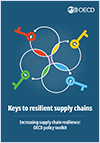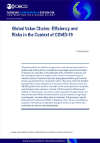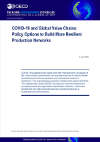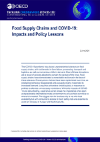 |
Building on this interactive web tool the OECD published in March 2024 an updated policy toolkit. Read more here: Keys to resilient supply chains: Increasing supply chain resilience |
Forum on Critical Supply Chains: Policy tools for preparedness and responsiveness
25-27 March 2024
The intricate networks of international flows of goods, services, capital, and technology that make up global supply chains are currently facing substantial challenges arising from geopolitical complexities and the impacts of climate change. Recent pandemic-related disruptions have revealed long-standing vulnerabilities in supply chains, especially those associated with concentration and dependence on a single economy or region for the supply of critical products, a circumstance exacerbated by recent geopolitical tensions. This Forum will discuss the complexity of supply chains and will bring together experts in key industries, think tanks, and relevant policymakers.
Join us for the high-level opening session on 26 March 2024 at 10:00 CET: Watch the livestream here.
Keys to resilient supply chains
Risk management tools: Anticipate risks
The COVID-19 pandemic and the consequent measures to contain it highlight how an acute shock can disrupt an interconnected world economy. International supply chains have been subjected to stress at the national and global levels. The experience demonstrates the need for policy options that strengthen the resilience of supply chains without undermining the benefits of open and rules-based international trade.
Anticipating and understanding the nature of these stresses is key to obtaining an accurate diagnosis of the problem. It will allow policy makers to identify the appropriate policy responses and provide insights on how to prepare for future shocks.
Click on the doors to find more about key policy actions to anticipate risk:
Keys to resilient supply chains
Domestic policy tools: Minimise exposure to shocks
At the national level, reducing risk and promoting growth need not be a zero sum dilemma. Investing in infrastructure, enabling digital trade, sound procurement management and regulatory flexibility can promote the resilience of supply chains while also contributing to productivity and competitiveness. These tools include some of the basic enabling conditions for international trade and represent long-term investments that have payoffs beyond crises.
Click on the doors to find out more about domestic policy actions that minimise exposure to risks:
Keys to resilient supply chains
Public-private tools: Build trust
OECD analysis highlights the key role of coordination and coherence among governments and consultation and cooperation between the public and private sector. It can be expected that international supply chains will continue to be subjected to unexpected disruptions. The public will continue to demand that governments take steps to ensure security of supply, and trade policy-makers will need policy solutions that address these expectations without resorting to beggar-thy-neighbour measures. Public-private cooperation can boost confidence that global supply chains will be able to provide needed goods and services at the right time and in the right quantities. These approaches include firm-level risk management strategies, public-private action plans, the stress testing of supply chains, and strategic governance at the national level.
Click on the doors to find more about public-private policy actions that build trust in global supply chains:
Keys to resilient supply chains
International tools: Keep markets open
While governments can take various actions at the national level, ensuring resilient global supply chains can require efforts at the international level. This can involve a full range of international economic co-operation tools, from multilateral, plurilateral and bilateral agreements, to softer forms of policy coordination and peer review.
Transparency is critical in helping governments manage fast-evolving crises. This includes sharing lessons learned, building confidence in supply and trust in global markets, and helping to avoid harmful policy choices such as panic buying or hoarding. Lowering barriers to trade and investment for essential products, as well as their main inputs, can maximise sourcing opportunities and access for all countries. Strengthening the resilience of key global value chains, however, may require new cooperation commitments from countries to prevent disruptions to markets, such as those observed during the COVID-19 pandemic.
Governments also play a pivotal role through trade facilitation measures, as these ensure the swift movement of goods across borders. Measures designed specifically for crises, such as fast clearance procedures or accelerating the certification processes, can help mitigate disruptions that affect international trade flows. Trade facilitation measures have generally proven to be more efficient when they are coordinated across countries, and even more so when they are included in a series of initiatives taken to promote cooperation, regulatory convergence, and the harmonisation of rules.
Click on the doors to find out more about international policy actions that keep markets open:
About this web tool
COVID-19 has placed significant strains on supply chains, with serious implications for international trade and investment. This experience demonstrates that international supply chains will continue to be subjected to unexpected disruptions. Citizens around the world will continue to demand that governments take steps to ensure security of supply, and trade policy makers will need policy solutions that address these expectations without resorting to beggar-thy-neighbour measures.
This interactive web tool provides a synthesis of ongoing OECD analysis from a trade policy perspective. The objective of the Four keys to resilient supply chains is to deepen the common evidence base, identify a toolkit of policy options, and improve communication about the importance of open markets during a pandemic.
Each of these four keys is comprised of issues, policy actions and relevant tools and publications. This evidence base will be kept up to date as new contributions emerge. It is hoped that a common base of evidence will promote coordination, coherence, consultations, and cooperation as governments and exporters strive to address unprecedented disruptions to international trade.
The OECD’s founding principles and values hold that open and rules-based international trade is an essential condition for economic growth from which all can benefit. We invite you to explore these four keys to resilient supply chains, in pursuit of a sustainable and inclusive economic recovery.
New work on resilience in supply chains
|
|
|
|
|
|
Policy guide
Identify potential risks
|
Determine government role
|
Strategies and guidelines
|
Shock diagnosis
|
Infrastructure
|
Digital trade
|
Procurement
|
Regulatory flexibility
|
Firm-level risk management strategies
|
Public-private action plans
|
Stress tests
|
Strategic governance
|
Predictability and transparency
|
International agreements
|
Trade facilitation
|
International regulatory cooperation
|

 OECD (2021),
OECD (2021),  OECD (2021),
OECD (2021),  OECD (2020),
OECD (2020),  OECD (2020),
OECD (2020),